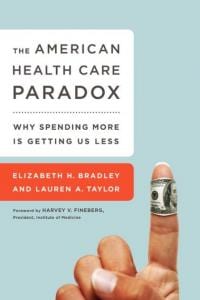For decades now, Americans have been arguing about how to fix the healthcare problem. We’re no closer today to either agreement or a solution than we were when the argument commenced in earnest in the 1990s with the reform attempts of the Clinton Administration. For that matter, we don’t even necessarily agree about what ‘healthcare’ might mean in the first place. Obviously some things are perfectly clear–the trip to the ER, or treatments involving prescription medication, for example. But what about the elliptical I bought to hang laundry on? Does that count as a ‘healthcare’ expense? What about the Tylenol we go through every time one of us get sick? That’s a marginal cost and it’s certainly not covered by insurance, but it’s also clearly medicine–so where does it fall in the discussion? What about just eating a salad once in a while? Or going for a walk?
Again, this is a complicated issue. Fortunately, we have a thoughtful book to at least help us think a bit more clearly about the subject in Elizabeth Bradley’s and Lauren Taylor’s The American Healthcare Paradox: Why Spending More is Getting Us Less.

Even if this weren’t an election year, this would be a good book to read for a number of reasons. First, it does an excellent job outlining the history of both American health care and American social services. It also does a very good job explaining the connection between these two–a connection that is obvious on reflection but which rarely appears in our public discussions of the issue. We all know that we’ll have to go to the doctor less if we were to eat better, exercise more, and have better personal relationships. And going to the doctor less means fewer expenses, lower premiums, etc. But Americans are generally unwilling to include the government in attempts to manage the social side of our healthcare issues (and perhaps not wrongly). Which gives us the meaning of the subtitle: spending more doesn’t get us better healthcare because we’re spending it on the back end. We go to the doctor when the damage has been done, rather than investing in health on the front end that keeps us from the doctor in the first place. A few more dollars invested in that salad/elliptical now saves us a ton of doctor’s bills down the road.
The American Health Care Paradox also does an excellent job of explaining alternative approaches, both foreign (especially the Scandinavian system) and domestic. This is especially worth reading up on with the 2020 election looming. Most Republicans don’t want to think about single-payer models that have a track record of success, and most Democrats don’t want to think about how de-centralized and reliant on local government autonomy those models are.
Christians should especially have an interest in reading this book. As believers we hold to the unity of the whole person. “Health” isn’t just something we do for the physical body–we have souls that require care as well. Social aspects of our health must be a part of our thought about the issue, whatever we think about the government’s role in those social aspects. What’s more, we should especially believe in the value of things like preventative care–not least because in modern America that means cultivating the virtue of self-control. Christians (and I am preaching to myself here, to be sure) need to be on the front line of resisting slavery to our appetites. The primary reason we do this is for the glory of God, but at least one side effect is the better health we’re looking for.
One thing that’s missing from this book, and it’s not terribly surprising that it is missing, given that the authors are academics and (I assume–possibly wrongly on my part) somewhat distant from the Evangelical world. Attempts to organize health care for pastors outside of otherwise expensive insurance plans like Samaritan Ministries get no mention. Likewise, the Affordable Care Act doesn’t get much attention, either positive or negative. A chapter walking through its details would be dated now that it has been at least partially overturned, but it would also be helpful to guide us in thinking about the successes and failures of the largest attempt at healthcare reform to date.
Even with those components missing, this book is still an excellent place to begin thinking about how to make American healthcare better.
Dr. Coyle Neal is co-host of the City of Man Podcast and an Associate Professor of Political Science at Southwest Baptist University in Bolivar, MO











